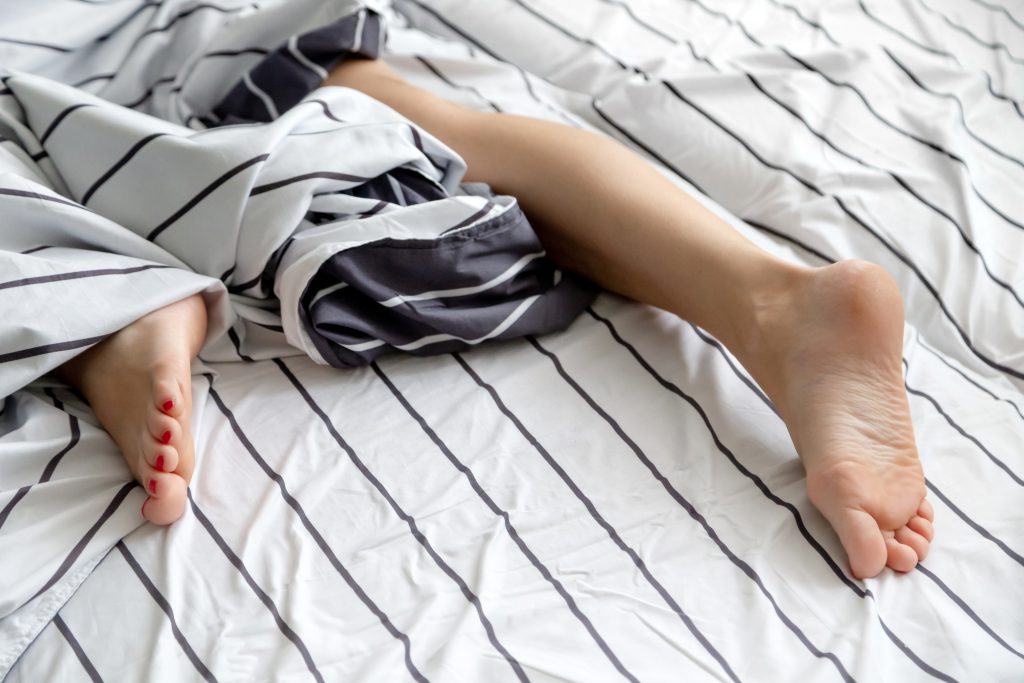Restless Legs Syndrome (RLS), also known as Willis-Ekbom disease, is described by the Mayo Clinic, (https://www.mayoclinic.org/diseases-conditions/restless-legs-syndrome/symptoms-causes/syc-20377168), as a neurological disorder characterized by an irresistible impulse to move the legs and frequently accompanied by uncomfortable leg sensations. Many people think of RLS as a disorder that only happens during sleep, but it often takes place during periods of inactivity, sitting/lying down, and sometimes is relieved by movement. When RLS does occur during sleep, it can significantly disrupt one’s rest, leading to daytime fatigue and impacting overall quality of life and wellbeing. July is Restless Legs Syndrome Awareness Month, and a great time to talk about, raise awareness and debunk some of the myths around this nighttime agony.
Aside from, “restless legs,” it may be hard to know what the real signs and symptoms may be. Like many disorders, RLS can range from mild, occasional discomfort to severe, chronic symptoms. With subtle symptoms, it can lead to delayed or misdiagnosis, which can impact one’s ability to function at their best. WebMD.com, which is a leading resource for many people looking up their symptoms, shares that RLS can feel like: Creeping, crawling, or itching sensations in the legs. Aching, throbbing, or pulling feelings. As well as the more common expectations of restlessness and an urge to move your legs. They also share that these symptoms worsen at night or during periods of inactivity.
Does this sound like you? It could be, that Mayo Clinic shared that RLS affects an estimated 7-10% of the population in the United States and Europe, with the likelihood increasing with age. However, self-diagnosis is not the way to go. Instead, reach out to your health care provider and share as many details as possible. Try to be specific about the sensations you experience, when they occur, and what you can do to find relief. Even better, keep track of your symptoms with times, severity, and anything you think might be a contributing factor. Your medical team probably wouldn’t mind if you keep track of your sleep patterns and have an up-to-date list of all your medications and supplements too!
While some lifestyle modifications are said to help with RLS management, these should always be consultation with your healthcare provider. Many new articles, blog posts and magazine articles will try to grab your attention with quick fixes and treatments that may or may not be safe for you. In general, lifestyle modifications such as regular exercise, avoiding caffeine and alcohol, establishing a regular sleep schedule, and practicing healthy sleep hygiene can always help to support your overall health and wellbeing.
Effective treatment for RLS that no old wife’s tale will bring:
- Better sleep quality.
- Less daytime fatigue and sleepiness. Improved concentration, productivity, and overall energy levels.
- Enhanced mood and reduced anxiety.
- Improved quality of life. Better sleep= better quality of life!
Risks of Untreated Restless Legs Syndrome
- Chronic sleep deprivation. This increases the risk of various health problems, including cardiovascular disease, diabetes, etc.
- Increased risks. Daytime sleepiness impairs alertness and reaction time, increasing the risk of accidents.
- Worsening symptoms. Over time, RLS symptoms can become more severe and more frequent.
- Mental health issues. Chronic sleep deprivation can contribute to depression, anxiety, and other mental health concerns.
This month is a reminder to reach out and talk to your healthcare teams if you have concerns about RLS. Sometimes other conditions can mimic RLS symptoms, and you may be just one visit away from a better night’s sleep. From letting your doctor talk to you about your medications, work/stress/life balance to seeing if you have a deficiency that may be leading to a restless night instead of a restful one, it’s worth the visit. If you aren’t sleeping well, ask for help to see what solutions might work for you. Everyone needs their rest, especially when your legs won’t quit!


